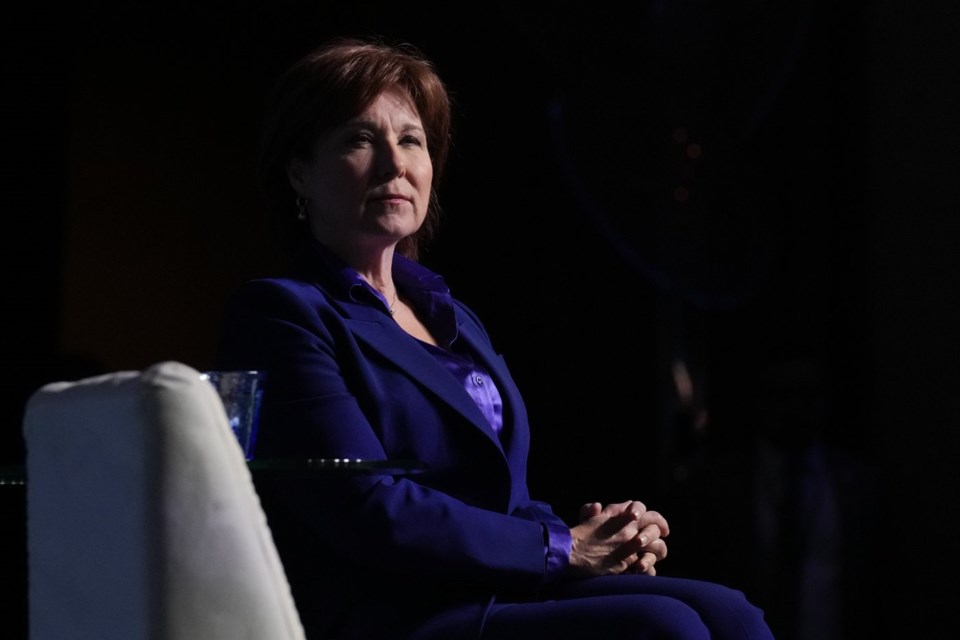OTTAWA — The race to replace Prime Minister Justin Trudeau as Liberal leader shifted again on Tuesday when Industry Minister François-Philippe Champagne and former B.C. premier Christy Clark both bowed out, and Government House leader Karina Gould signalled she's in.
The two high-profile departures will cast a spotlight on candidates' French language skills and their ability to organize support in Quebec, now that the race lacks a strong, bilingual front-runner from a province that's critical to the Liberals' electoral fortunes.
Champagne, long seen as a potential successor to Trudeau, said during an armchair talk in Toronto he will not enter the race, adding he plans to focus on ensuring the government is ready to protect Canadian industry from the trade threats posed by incoming U.S. president Donald Trump.
"It was probably the most difficult decision of my life, but I think it was the right one at the right time," Champagne said. "There are many ways to fight for Canada."
Foreign Affairs Minister Mélanie Joly, Finance Minister Dominic LeBlanc and Transport Minister Anita Anand have all ruled out leadership runs recently.
Those cabinet ministers had also featured prominently for years in media speculation about Trudeau's potential successors, and Joly, LeBlanc and Champagne would have been strong, fluently bilingual candidates.
Clark said in a statement to her supporters that Trudeau had called too short a leadership race to allow her to mount a successful campaign and that she did not develop her French skills well enough to be a strong candidate.
"I have made the difficult decision to step back," she said. "While we have come a long way, in a short time, there is simply not enough time to mount a successful campaign and for me to effectively connect with francophone Canadians in their language. I have worked hard at improving my French but it’s not where it needs to be today."
Two more presumed front-runners — former finance minister Chrystia Freeland and former Bank of Canada governor Mark Carney — are expected to announce their own leadership bids in the coming days, along with Gould.
Gould played coy at a news conference in Burlington, Ont. on Tuesday, saying she would have more to say in the coming days. The 37-year-old Gould said she thinks it will be "extremely important to have a younger voice in the race who can relate to people where they are and the struggles they're facing today."
Ontario MP Chandra Arya and former Montreal MP Frank Baylis also have announced plans to run for the leadership. Cape Breton MP Jaime Battiste says he will run and would become the first Indigenous candidate for prime minister.
Arya raised eyebrows in Ottawa political circles when he said it's not important for the next leader to be able to speak French.
"I can't imagine either the leader of our party or the next prime minister not being fluent in French," Heritage Minister Pascale St-Onge said in an interview, when asked about the importance of having bilingual leadership candidates. "I don't see the Liberal party or the country moving backwards on this. It's something that makes Canada what it is."
Jonathan Kalles, a consultant at McMillan Vantage and a former Quebec adviser in the Prime Minister's Office, said leadership candidates will have to quickly denounce Arya’s “outrageous statements or they will have no credibility.”
“It needs to be clear that while there is no francophone Quebecer running in this race, that they understand the priorities, needs and interests of Quebecers, that they have strong Quebec teams ... that understand and respect Quebec,” he said. “Otherwise, it will come back to bite them in the next election.”
Both Champagne and Joly are well-connected to the party machinery in Quebec and the remaining candidates can be expected to seek their endorsements. Joly has a decent political organization built up, Kalles said, while Champagne is Quebec co-chair for the Liberal campaign.
Prospective candidates will be hunting for votes from all 78 ridings in Quebec. Each electoral district is allocated 100 points in the leadership contest, according to the party's constitution.
Stéphanie Chouinard, an associate professor of political science at Queen’s University, said the absence of a strong, bilingual Quebec candidate could make the election a harder slog on the ground for the Liberals in the province, and in other regions of the country with large francophone populations.
“For the few who have said officially that they're joining the race or who are strongly expected to join, they will have to prove that they understand the province of Quebec and that they can at least minimally convey their message in the language of the majority of that province,” she said.
She said many Liberal supporters see fluency in both languages as an important quality in a leader and a mark of statesmanship.
"It’s not just francophones who will be paying attention to this issue."
Clark's announcement that she won't be running came just days after she was forced to backtrack from her claim that she was never a member of the Conservative party.
In an interview on CBC Radio's Saturday politics show The House, Clark denied she became a party member and voted for former Quebec premier Jean Charest in the 2022 Conservative leadership race that elected Pierre Poilievre.
Clark said in the interview she never joined the party or received a ballot for the race. But the Conservative party provided a screenshot of their electronic records showing Clark was an active party member from June 2, 2022 to June 30, 2023.
Clark later posted a facepalm emoji on social media, said she misspoke in the interview and acknowledged that she had backed Charest to stop Poilievre from winning.
This report by The Canadian Press was first published Jan. 14, 2024.
— With files from Rob Drinkwater in Edmonton and Anja Karadeglija in Ottawa.
Kyle Duggan, The Canadian Press

